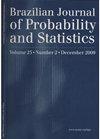均值异方差分析的单阶段抽样程序
IF 0.5
4区 数学
Q4 STATISTICS & PROBABILITY
引用次数: 1
摘要
平均值分析(ANOM)是一种可以将每个治疗的平均值与总体平均值进行比较的方法。根据统计数据分析的图形结果,我们可以指定哪一个不同于另一个。经典ANOM模型的一个假设是方差相等。然而,这种做法并不总是正确的。为了解决未知和不相等的总体方差,Nelson和Dudewicz(2002)提出了一种两阶段抽样程序。然而,在两阶段采样程序的第二阶段需要添加额外的样本,因此由于时间有限和预算不足,这并不总是可行的。因此,在异方差条件下,我们应用Chen和Lam(1989)的单阶段抽样程序来解决两阶段抽样程序的缺点。此外,我们还提供了一个说明性的例子和实际应用的关键价值。为了使程序用户友好,我们使用R Shiny构建了一个界面。本文章由计算机程序翻译,如有差异,请以英文原文为准。
Single-stage sampling procedure for heteroscedasticity analysis of means
. The analysis of means (ANOM) is a method that can compare the mean of each treatment to the overall mean. According to the graphical result of a statistical data analysis, we can specify which one is different from another. One of the assumptions of the classical ANOM model is that the variances are equal. However, it is not always true for the practice. To solve unknown and unequal population variances, Nelson and Dudewicz (2002) proposed a two-stage sampling procedure. However, additional samples need to be added in the second stage of the two-stage sampling procedure, so it is not practical all the time due to limited time and insufficient budget. Thus, under heteroscedasticity, we applied Chen and Lam’s (1989) single-stage sampling procedure to solve the drawback of the two-stage sampling procedure. In addition, we also provided an illustrative example and critical values for practical uses. In order to make the procedure user-friendly, we built an interface by using R Shiny.
求助全文
通过发布文献求助,成功后即可免费获取论文全文。
去求助
来源期刊

Brazilian Journal of Probability and Statistics
STATISTICS & PROBABILITY-
CiteScore
1.60
自引率
10.00%
发文量
30
审稿时长
>12 weeks
期刊介绍:
The Brazilian Journal of Probability and Statistics aims to publish high quality research papers in applied probability, applied statistics, computational statistics, mathematical statistics, probability theory and stochastic processes.
More specifically, the following types of contributions will be considered:
(i) Original articles dealing with methodological developments, comparison of competing techniques or their computational aspects.
(ii) Original articles developing theoretical results.
(iii) Articles that contain novel applications of existing methodologies to practical problems. For these papers the focus is in the importance and originality of the applied problem, as well as, applications of the best available methodologies to solve it.
(iv) Survey articles containing a thorough coverage of topics of broad interest to probability and statistics. The journal will occasionally publish book reviews, invited papers and essays on the teaching of statistics.
 求助内容:
求助内容: 应助结果提醒方式:
应助结果提醒方式:


